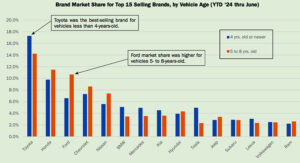While insufficient charging infrastructure and range limitations are often cited as reasons for this slowdown, they don’t fully explain the stagnation
Oyster Bay, N.Y.—The latest forecasts from global technology intelligence firm ABI Research find that global electric vehicle (EV) sales are expected to grow by 21% in 2024 and 19% in 2025. This represents a significant decline from growth rates of 31% in 2023 and 60% in 2022.
“A shortage of chargers and limited ranges are not to blame for this decline. It’s evident from sales data and statements by Original Equipment Manufacturers (OEMs) that the EV market is slowing down and failing to meet its targets. While insufficient charging infrastructure and range limitations are often cited as reasons for this slowdown, they don’t fully explain the stagnation, especially considering that these aspects are actually improving rather than deteriorating. Additionally, these explanations fail to consider the region-specific trends driving the EV sector changes,” says Dylan Khoo, Electric Vehicles Industry Analyst, ABi Research.
There has been a real and significant stagnation in EV sales growth in Germany and the United Kingdom due primarily to the withdrawal of subsidies. This has dictated the narrative for the continent as these are Europe’s largest car markets, but two-thirds of European countries’ growth was higher in 2023 than in the year prior. Sales problems in the U.S. can be attributed to an unsustainable reliance on Tesla, which is faltering as the supply of early adopters dwindles and the market moves toward mass adoption.
In China, meanwhile, the market is now in a period of linear growth as EVs achieved a 36% market share in 2023 and are expected to make up over half of all car sales by 2025. BYD has continued to drive down the price of EVs to the point that in many segments they are now the same price or cheaper than their Internal Combustion Engine (ICE) equivalents. The Chinese EV transition is in full swing, operating under its own steam and no longer dependent on government subsidies.
“China has set an example for the world to follow and demonstrated how to win over the public with EVs. If automakers can make a wide range of EVs at an attractive price, people will buy them. It is here that Europe and North America are failing, a situation unlikely to be rectified until new battery gigafactories become operational and more models become available in the latter half of the decade,” concludes Khoo.
These findings are from ABI Research’s The EV Market Slowdown application analysis report.





Comments are closed.